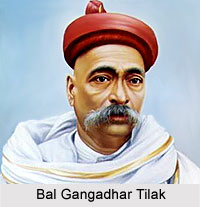 Early life of Bal Gangadhar Tilak was spent in a modest family full of poverty and adversity. He was born on July 23, 1856, at Ratnagiri a town on the coastal strip between Goa and Gujarat, known as Konkan. His father Gangadharpant was a teacher in the department of education. In 1861 Tilak entered school at Ratnagiri. When the family moved to Pune he continued his school education there. In 1872, when Bal Gangadhar was not yet sixteen, his father died. A year earlier, before he had finished his secondary education, Bal Gangadhar was married. In 1873 he enrolled at the Deccan College in Pune and soon advanced in mathematics and Sanskrit literature. In 1878 he took his degree of Bachelor of Arts. and in 1879 his L.L.B., devoting special attention to Hindu Law. Thus Tilak prepared himself for a legal career.
Early life of Bal Gangadhar Tilak was spent in a modest family full of poverty and adversity. He was born on July 23, 1856, at Ratnagiri a town on the coastal strip between Goa and Gujarat, known as Konkan. His father Gangadharpant was a teacher in the department of education. In 1861 Tilak entered school at Ratnagiri. When the family moved to Pune he continued his school education there. In 1872, when Bal Gangadhar was not yet sixteen, his father died. A year earlier, before he had finished his secondary education, Bal Gangadhar was married. In 1873 he enrolled at the Deccan College in Pune and soon advanced in mathematics and Sanskrit literature. In 1878 he took his degree of Bachelor of Arts. and in 1879 his L.L.B., devoting special attention to Hindu Law. Thus Tilak prepared himself for a legal career.
Tilak belonged to an impoverished Brahman sect which, with the fall of the Peshwa dynasty, had lost its feudal landlord privileges. Tilak, who graduated from Deccan College, Pune in 1877, was among one of the first generation of Indians to receive a college education. Tilak believed that, religion and practical life are not different. According to him, to take to Sanyasa (renunciation) is not to abandon life. His dedication to humanity was a fundamental element in the Indian Nationalist movement. After graduating, Tilak taught mathematics in a private school in Pune. Later due to some philosophical disparity with the colleagues in the New School, he decided to leave the job.
In that time frame he became a journalist. He was a tough critic of the Western education system, and felt that it demeaned the Indian students and insulted India`s heritage. He organised the Deccan Education Society with a few of his college friends, including Mahadev Ballal Namjoshi, Gopal Ganesh Agarkar, and Vishnu Krishna Chiplunkar whose goal was to progress the quality of education for India`s youth. Tilak also co-founded two newspapers, the Kesari and the Maratha. The Deccan Education Society was set up to generate a new system that taught young Indians nationalist ideas through a stress on Indian culture. Tilak started a mass movement towards independence that was disguised by an emphasis on a religious and cultural restoration. He taught Mathematics at Fergusson College.
Bal Gangadhar Tilak joined the Indian National Congress in 1890 thus embarking on a full time political career.






